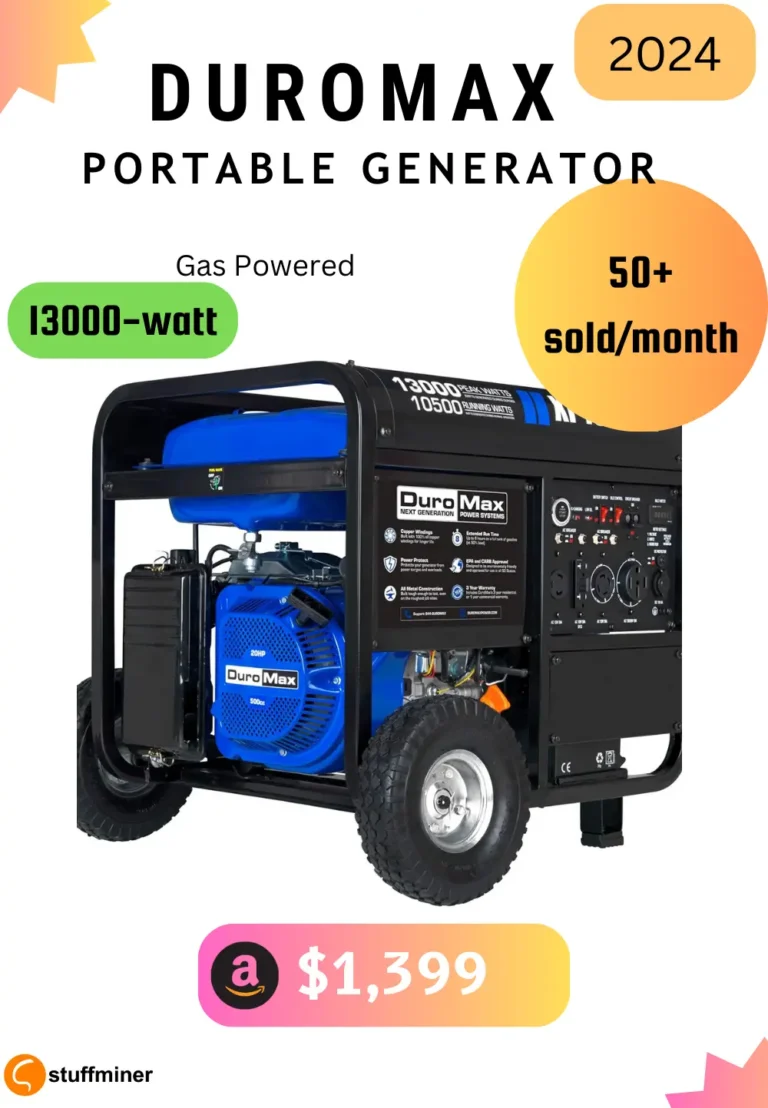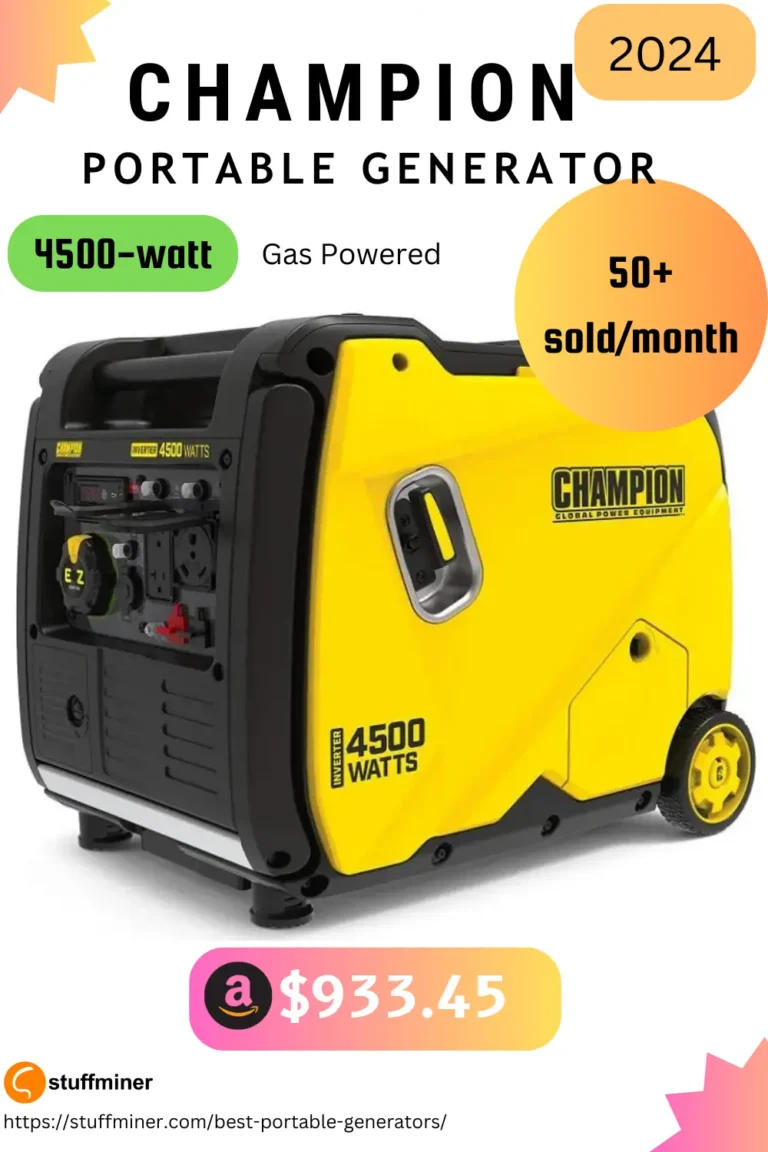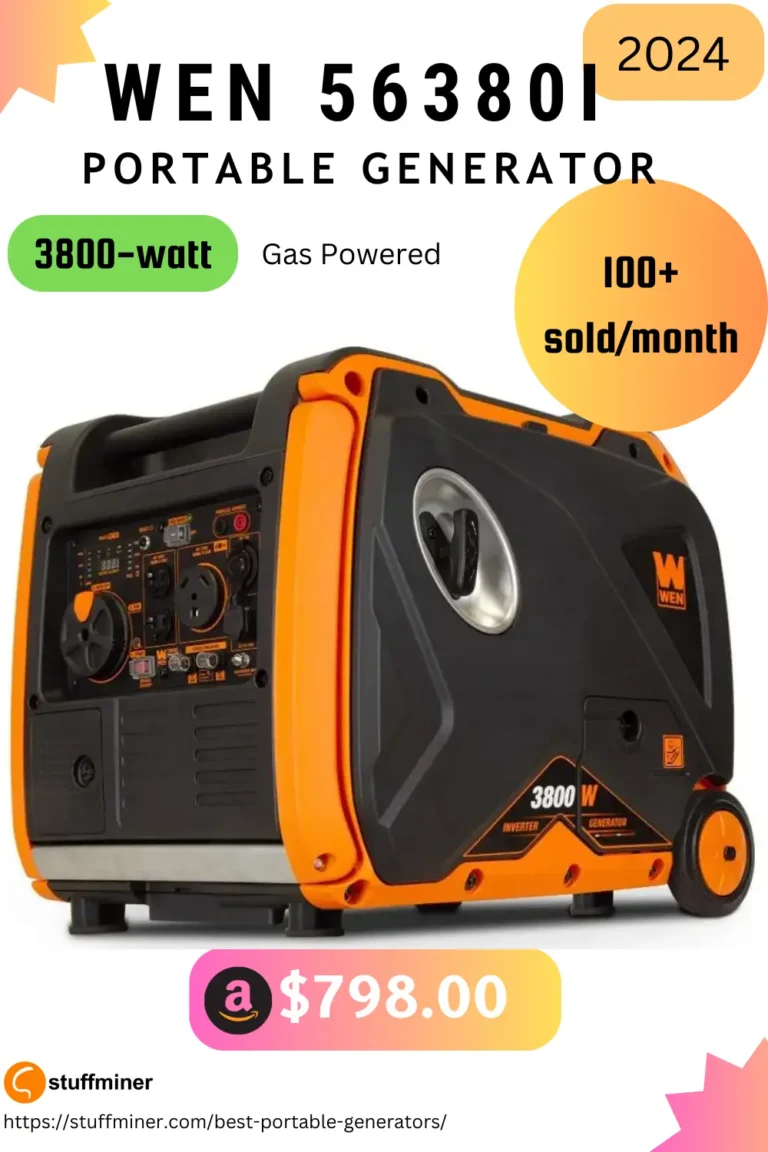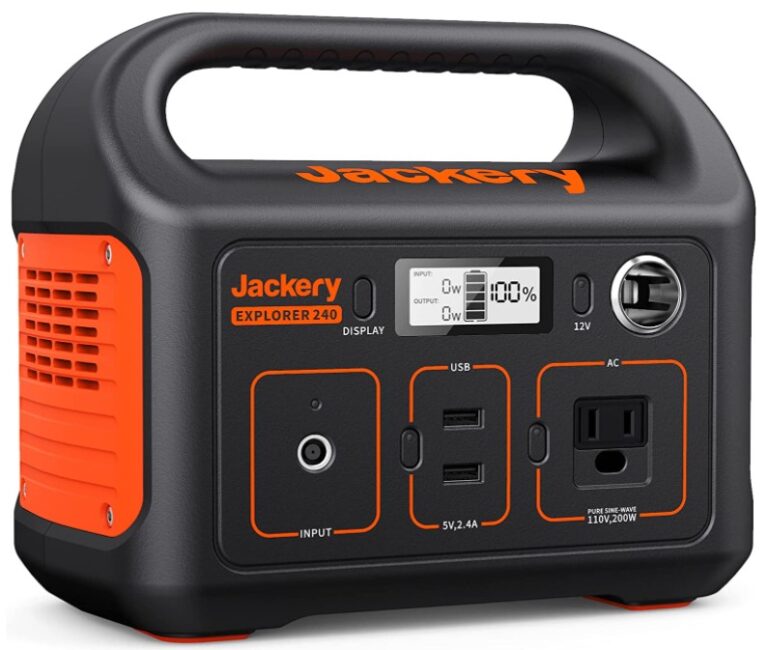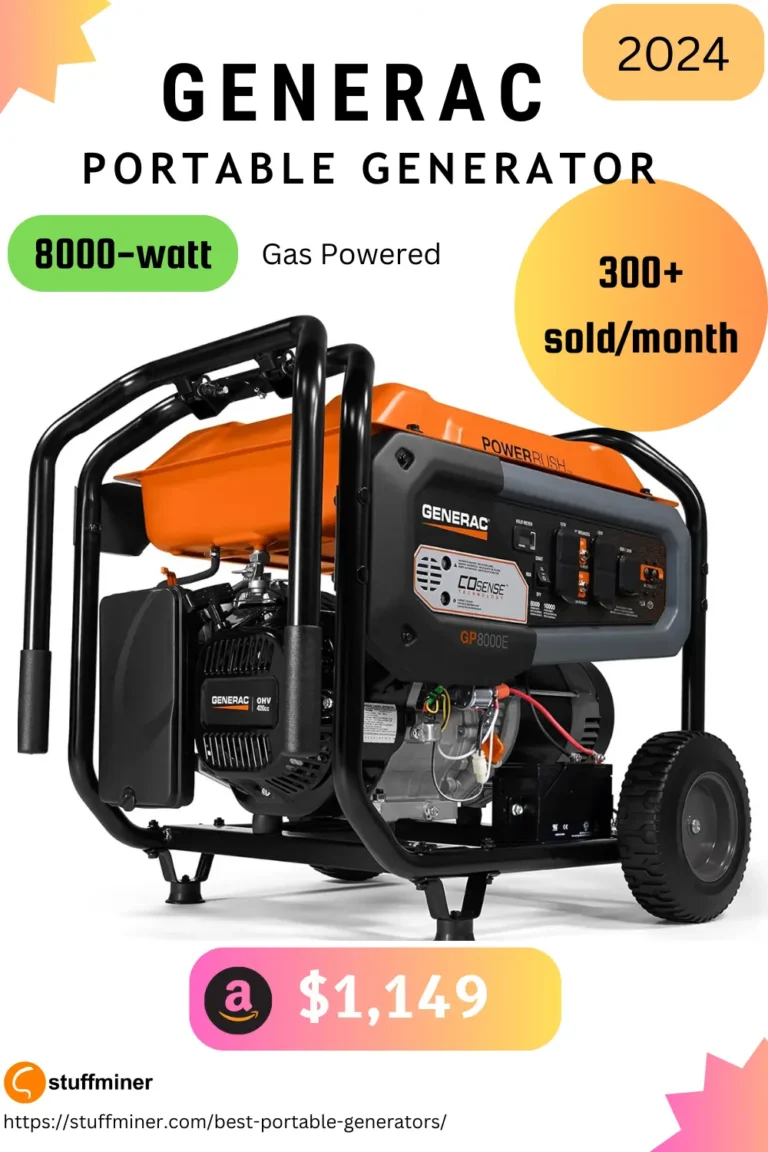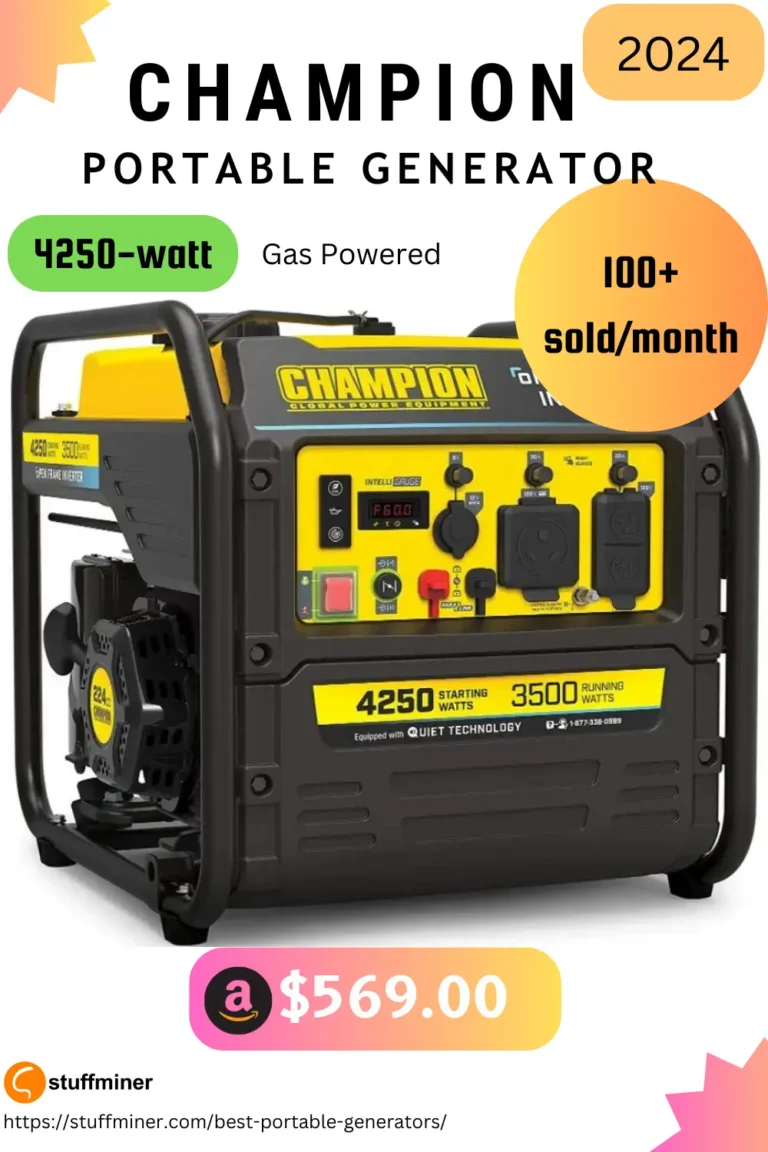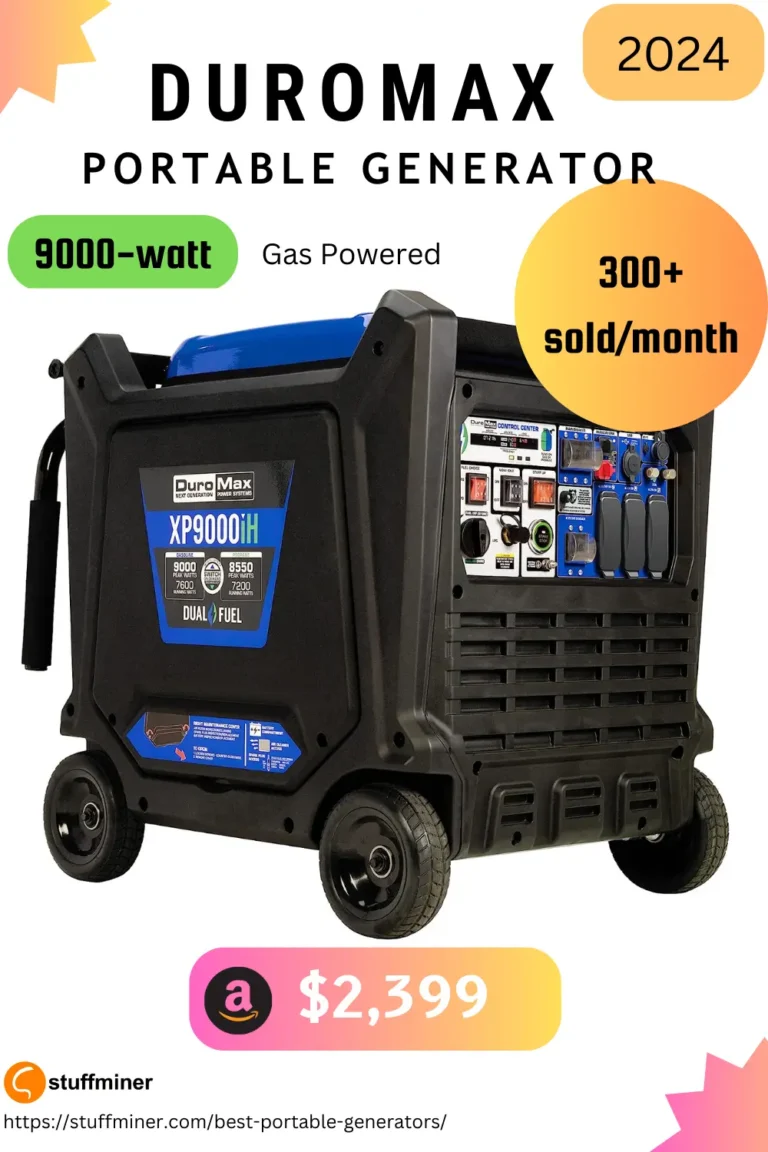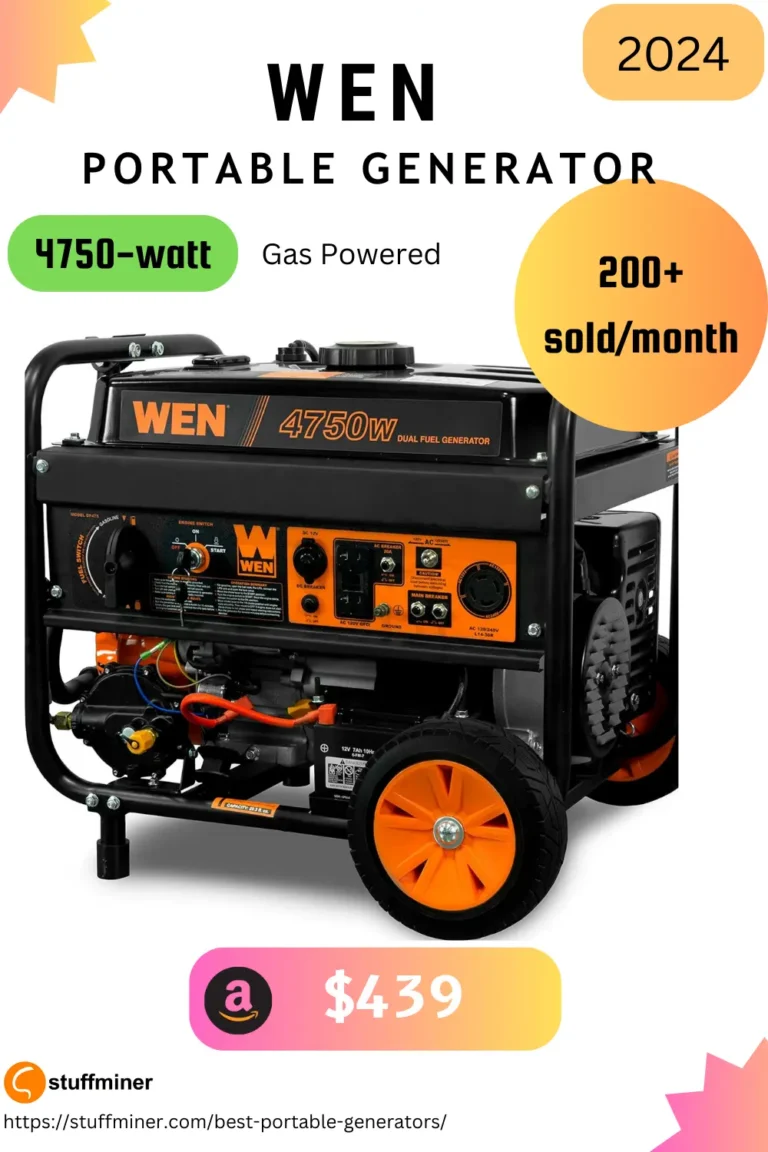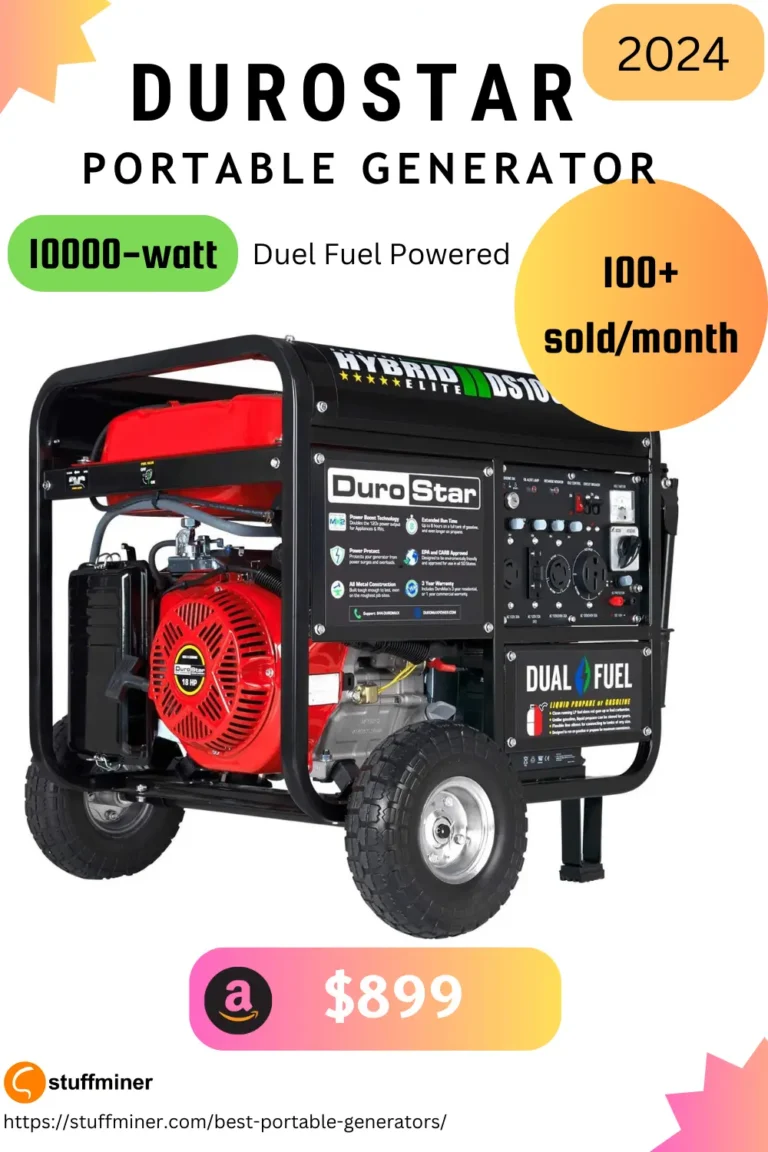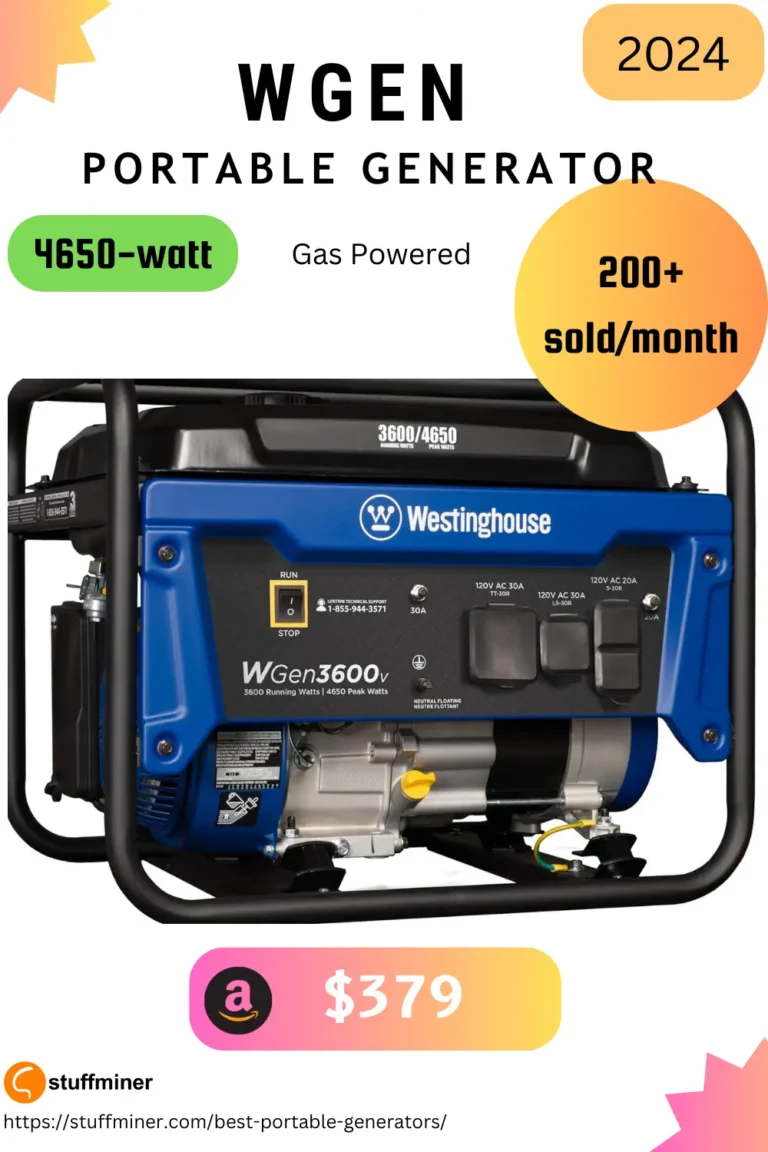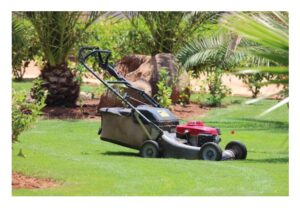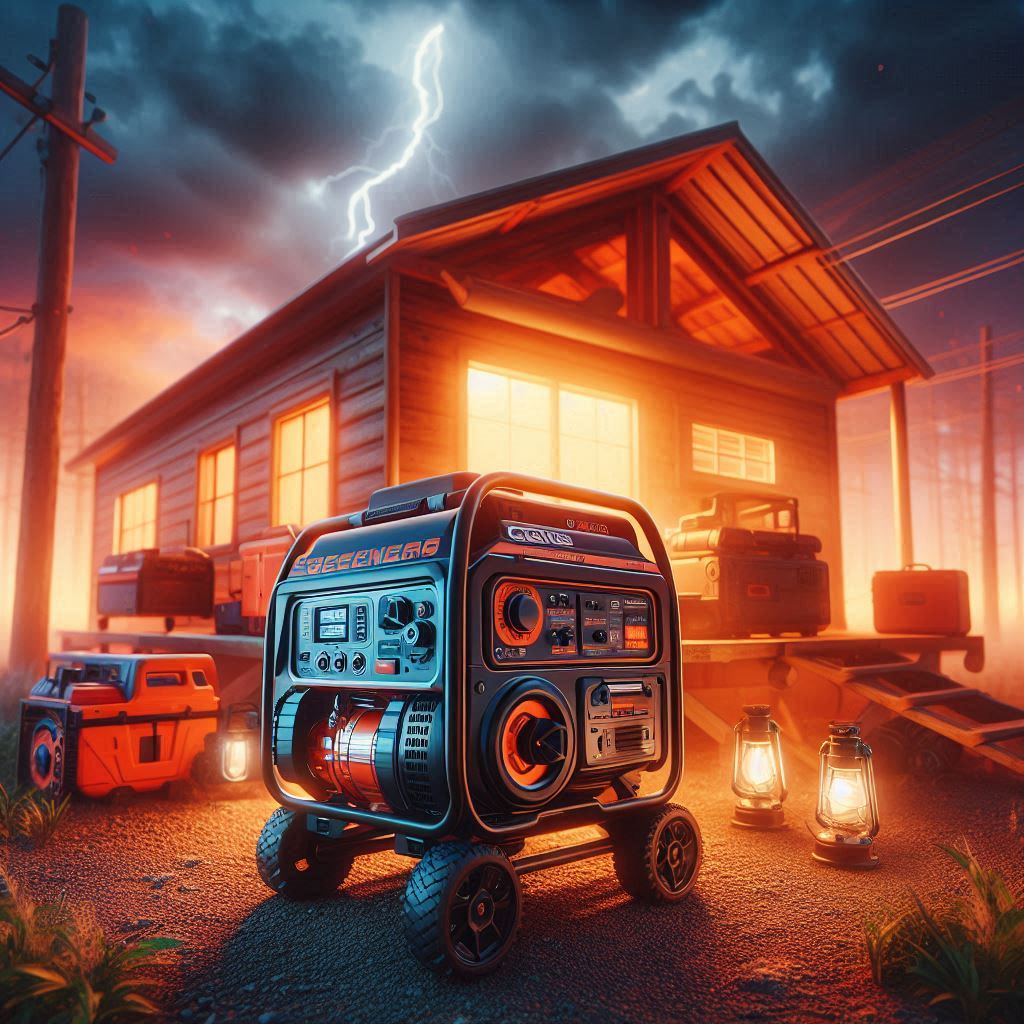
Find the best portable generators of 2024, including top selling and carb compliant options, perfect for home use. Our top 10 list features small generators, large generators, and 10000 watt power houses from the best brands on the market.
We’ll help you find reliable and powerful generators for home backup power needs, whether you’re looking for gas powered or other fuel types.
DuroMax XP13000E is best 13000 watt portable generator. I assure you, you’ll definitely love its outstanding performance and super quiet sound that’s not loud to interrupt you having a conversation.
Champion 200986 is best portable generator under $1000. It’s super quiet, you can hear what your neighbors thinking.
Generac 7676 is one the best 10000 watt inverter generator.These top best selling portable gas generators are worth every penny.
WEN DF475T is one of the best carb compliant portable generator. I can say confidently that it’s worth the investment.
To pick the best strongest 10 best portable generators, stuffminer has reviewed a lot of hours and lists the Top 10 best selling portable power generators that are super quiet and long-lasting.
10 Best Portable gas generators
DuroMax XP13000E Gas Powered Portable Generator 13000 Watt Electric StartHome Back Up And RV Ready, 50 State Approved, Blue, Black
- Brand: DuroMax
- Wattage: 10500 watts
- Gas Powered
- Fuel Type: Gasoline
- Dimensions: 30 x 29 x 26 inches
- Weight: 236 Pounds
- Color: Blue/Black
- Voltage 240 Volts
- Engine Type: 4 Stroke
- Engine Displacement: 500 Cubic Centimeters
- Frequency 60 Hz
Champion Power Equipment 200986 4500 Watt Portable Inverter Generator, RV Ready
- Brand: Champion Power
- Gas Powered
- Wattage: 4500 watts
- Dimensions: 23.2 x 17.7 x 20.1 inches
- Item Weight: 95 Pounds
- Color: RV Ready
- Voltage: 120 Volts
- Engine Type: 4 Stroke
- Engine Displacement: 212 CC
- Frequency 60 Hz
- Runtime: 14 hours
WEN 56380i Super Quiet 3800 Watt Portable Inverter Generator with Fuel Shut-Off
- Brand: WEN
- Gas Powered
- Fuel Type: Gasoline
- Super Quiet, Electric Start
- Wattage: 3800 watts
- Weight: 99.2 Pounds
- Engine Type: 4 Stroke
- Voltage: 120 Volts
- Dimensions: 23.2 x 18 x 20.1 inches
- Color: Orange and Black
- Displacement: 212 CC
- Limited Maintenance, Pure sine wave, clean power
- Portable Design
Jackery Portable Power Station Explorer 240, 240Wh Backup Lithium Battery, 110V 200W Pure Sine Wave AC Outlet, Solar Generator (Solar Panel Not Included) for Outdoors Camping Travel Hunting Emergency
- Brand: Jackery
- Wattage: 200 watts
- Dimensions: 9.05 x 5.24 x 7.87 inches
- Weight: 3.1 Kilograms
- Color: Black
- Voltage: 110 Volts AC
- Frequency: 60 Hz
- Output Wattage: 200 Watts
- Easy for a Child to carry
- Versatile Power Source
Generac 7676 GP8000E Portable Generator, Orange, Black
- Brand: Generac
- Gas Powered
- Electric Start
- Wattage: 8000 watts
- Item Weight: 214 Pounds
- Runtime 11 hours
- Dimensions: 27.2 x 27 x 26.5 inches
- Color: Orange and Black
- Large-capacity steel fuel tank
Champion Power Equipment 200954 4250-Watt RV Ready Open Frame Inverter Generator, Quiet Technology
- Brand: Champion Power Equipment
- Gas Powered
- Fuel Tank: 2.3 Gallon
- wattage: 4250 watts
- Voltage: 120 Volts
- Item Weight: 75 Pounds
- Engine Type: 4 Stroke
- Dimensions: 20.9 x 18.3 x 19.4 inches
- Superior filtering capabilities
- Engine Displacement: 224cc
- Frequency 60 Hz
- Runtime: 22 hours
- RV Ready, Parallel Ready, Clean electricty
- Included Items: USB Adapter, Handle, Engine Oil, Oil Funnel.
DuroMax XP9000iH 9000-Watt 459cc Dual Fuel Digital Inverter Hybrid Portable Generator, Blue
- Brand: DuroMax
- Gas Powered
- Fuel Type: Gasoline, Liquefied Petroleum Gas
- Dual Fuel Technology, Gas or Propane
- Wattage: 9000 watts
- Item Dimensions: 27 x 21 x 25 inches
- Item Weight: 256 Pounds
- Color: Blue
- Output Wattage: 9000 Watts
- Remote Start,Digital Control Centre
- All Copper Windings, Clean Power
- Eco-Friendly, More Affordable
- Parallel Capable,USB A Outlet & USB C Outlet
WEN DF475T Dual Fuel 120V 240V Portable Generator with Electric Start Transfer Switch Ready, 4750Watt, CARB Compliant
- Brand: WEN
- Gas Powered
- Dual Fuel Portable Generator
- Fuel Type: Gasoline, Liquefied Petroleum Gas
- Engine Type: 4 Stroke
- Engine Displacement: 224cc
- Electric Start System
- Wattage: 4750 watts
- Item: 23.2 x 17.5 x 18.5 inches
- Item Weight: 105.8 Pounds
- Color: CARB Compliant
- Output wattage: 4750 watts
- Tank Volume: 4 Gallons
- Runtime: 11 hours
- 120V/240V Reliable Power
DuroStar DS10000EH Dual Fuel Portable Generator-10000 Watt Electric Start Home Back Up & RV Ready, 50 State Approved, Red Black
- Brand: DuroStar
- Fuel: Gasoline/propane
- Wattage: 10000 watts
- Engine Type: 4 Stroke
- Engine Displacement: 439cc
- Voltage: 120 Volts, Frequency: 60 Hz
- Item Weight: 238 Pounds
- Item Dimensions: 30 x 30 x 28 inches
- Color: Red and Black
- 8.3 Gal Fuel Tank
- Ignition System Type: Electronic
- All Metal Construction
- Easy to Transport, Perfect for Home Backup
Westinghouse WGen3600v Portable Generator 3600 Rated and 4650 Peak Watts, RV Ready, Gas Powered, CARB Compliant
- Brand: Westinghouse
- Wattage: 3600 watts
- Item Dimensions LxWxH: 23.3 x 17.5 x 18.7 inches
- Color: Gas Powered, CARB Compliant
- Voltage: 120 Volts
- Engine Type: 4 Stroke
- Total Power Outlets: 4
- Engine Displacement: 212cc
- Runtime: 14 hours
“2000-4000 watt“
As a general rule of thumb, a 2000-4000 watt portable generator should be sufficient for most basic camping needs.
A 2000-3000 watt generator is typically sufficient for basic camping needs.
A best Generator should be these qualities:
1. Noise level (low decibel rating).
2. Size and portability (compact and lightweight).
3. Power output (match your needs).
4. Fuel efficiency.
Portable generators usually run 8-12 hours per day. Check the manufacturer’s guidelines for your model. Running too long can damage the generator and be unsafe. Keep fuel levels monitored
If you are camping in a remote location with no access to electricity, and you plan to stay for an extended period of time, a generator can be a useful tool to power appliances, charge electronic devices, or provide light at night.
Here is the best Generators for Camping:
Generator placement tips:
1. Keep it 20 feet from the campsite for safety.
2. Set it on flat ground to prevent tipping.
3. Shelter it from rain, if possible.
4. Secure it to prevent theft or tipping.
Ensure good ventilation to avoid carbon monoxide buildup.
To determine the right generator size:
1. List appliances and their power (watts).
2. Factor in surge watts for some devices.
3. Calculate daily watt hour usage.
4. Choose a generator that meets or exceeds your total wattage needs. Consider portability, cost, and follow manufacturer instructions for safe use.
Check campsite rules for generator use. Some places limit hours, noise, and distance from other sites. Some areas are generator free. Be respectful, follow rules, and dispose of waste properly
Never run a generator in a tent or enclosed space. It releases a deadly, odorless gas called carbon monoxide. Use it outside, follow safety instructions, and be safe.
“3,000 to 5,000”
A small house with basic electrical needs will require a generator with a capacity of at least 3,000 to 5,000 watts. This would allow you to power essential appliances such as lights, refrigerator, and a few small electrical devices.
“3000 to 5000”
As a general rule, a good wattage for a portable generator is between 3,000 and 7,500 watts.
A 3,000-watt generator is ideal for powering essential appliances such as lights, refrigerator, and small electrical devices. It can also power small power tools, fans, and some electronics.
A 5,000-watt generator can power most essential appliances as well as larger power tools such as circular saws, air compressors, and some pumps.
A 7,500-watt generator can power a wider range of appliances and power tools, including larger air conditioners, electric water heaters, and some larger pumps.
Of course, the specific wattage you need will depend on your individual needs. It’s a good idea to make a list of all the electrical devices and appliances you plan to power with your portable generator, and then determine the total wattage requirements. Make sure to choose a generator that can handle at least that amount of wattage, with some extra capacity for unexpected power surges or additional appliances in the future.
If you plan to live off grid, you will need a larger generator than if you only plan to use it for occasional power outages or outdoor activities. A typical off grid home may require a generator with a capacity of 10,000 to 20,000 watts.
Here are some examples of power needs for typical off-grid appliances and devices:
- Refrigerator: 600-800 watts
- Well pump: 2,000-3,000 watts
- Electric range or stove: 3,000-5,000 watts
- Air conditioning: 2,000-5,000 watts
- Water heater: 3,000-5,000 watts
- Power tools: 500-2,000 watts
A generator with a capacity of at least 3,000 to 5,000 watts can power essential appliances such as lights and refrigerators.
“3000 to 5000”
Propane generators are cost-effective and cleaner than gasoline. They require less maintenance due to fewer engine deposits. Initial cost is higher, but they’re better for long term use.
Portable generator runtime on a tank of gas depends on what is your tank size, generator power, and load. Typically, it uses 0.5-1 gallon per hour at 50% load, providing 5-10 hours with a 5-gallon tank. Running at higher loads consumes more, while lower loads use less fuel.
No, it is not OK to run a portable generator out of gas. Running a generator without fuel can cause damage to the engine and other components, as well as void the warranty. It’s important to properly maintain and fuel the generator to ensure its safe and reliable operation.
Portable generators are safe to run for 8-12 hours, depending on size and load. Check the manufacturer’s guidelines for specific recommendations. To prevent overheating and wear, take breaks for cooling, maintain the engine, and keep fuel available.
A portable generator with a capacity of at least 3,000 to 5,000 watts can power essential appliances such as lights and refrigerators.
“3000 to 5000”
To link a portable generator to your home, hire an electrician to set up a transfer switch. It ensures safe switching between utility and generator power, preventing grid issues. Then connect your generator with a sturdy extension cord, following safety instructions.
Portable generators should be placed at least 10 feet away from the house, to avoid the risk of carbon monoxide (CO) poisoning. CO is a colorless, odorless gas that can build up quickly and cause serious health problems.
To calculate the right generator size:
1. List your devices.
2. Find and add up their wattages.
3. Consider devices with higher starting wattages.
4. Choose a generator with rated wattage equal to or higher than the total calculated.
Slightly larger is a good idea for future needs
The kVA needed for a house depends on the appliances used. To calculate it, add up the wattage of devices used simultaneously and divide by the power factor (kVA = kW / power factor). Small houses usually need 5-10 kVA, while larger ones may require 15 kVA or more. Consult a licensed electrician for precise calculations.
Generators use fuel engines to produce varying AC power. Inverters convert DC power from batteries into stable AC power using electronic circuits. Inverter generators combine both methods, providing fuel efficiency, quiet operation, and stable power, making them ideal for camping and outdoor activities
A 1500-watt generator with a 1-gallon tank runs about 8 hours at 50% load (around 750 watts). Higher loads mean shorter runtime, around 3-4 hours at full load. Runtime varies based on factors like generator age, fuel quality, and environmental conditions. Consult manufacturer specs and maintain the generator for best results.
Here are a few Most reliable Generators:
-
WEN: WEN is a well-known brand that produces high-quality and reliable generators that are often used for residential, commercial, and industrial applications.
-
DuroMax: Generac is another reputable brand that produces durable and efficient generators with advanced features and technologies.
-
Champion: Champion is a popular brand that offers affordable and reliable generators for a range of applications, including home backup, camping, and construction.
-
Generac: Generac is a leading brand in the backup power industry, offering a wide range of reliable and efficient generators for home, commercial, and industrial use.
-
Westinghouse: Westinghouse is a newer brand that has gained a reputation for producing high-quality and reliable generators at an affordable price.
To choose the best generator here are some factors to consider:
- Power output: Choose a generator that can provide enough power to meet your home’s electrical needs. Consider the starting and running wattage of the appliances and devices you need to power during an outage.
- Fuel type: Generators can run on gasoline, propane, or diesel fuel. Gasoline is the most common fuel type for portable generators, but propane and diesel generators can be more fuel-efficient and have longer runtimes.
- Portability: If you plan to use the generator primarily at home, portability may not be a major concern. However, if you need to move the generator frequently, a lightweight and compact design may be more convenient.
- Noise level: Generators can be noisy, so consider a model that produces low noise levels, especially if you have close neighbors.
- Brand reputation: Choose a generator from a reputable brand with a history of producing high-quality and reliable products.
- DuroMax XP13000E 13000 watts
- Champion Power 4500 watts 200986
- WEN 56380i 3800 watts
- Goal Zero Yeti 3000X Portable Power Station,
- Generac 7676 GP8000E 8000 watts
- Champion Power 200954 4250 watts
- DuroMax XP9000iH 9000 watts
- WEN DF475T 4750 watts
- DuroStar DS10000EH 10000 watts
- Westinghouse WGen3600v 3600 watts
there are several well-known generator brands that are recognized for their quality and reliability, based on customer reviews and industry evaluations.
- Honda: Honda is a well-known brand that produces high-quality and reliable generators that are often used for residential, commercial, and industrial applications.
Honda EU1000i Inverter Generator, Super Quiet, Eco-Throttle, 1000 Watts
- DuroMax: DuroMax is another reputable brand that produces durable and efficient generators with advanced features and technologies.
- Generac: Generac is a leading brand in the backup power industry, offering a wide range of reliable and efficient generators for home, commercial, and industrial use.
- Westinghouse: Westinghouse is a newer brand that has gained a reputation for producing high-quality and reliable generators at an affordable price.
When choosing a generator, it’s important to consider your specific needs and requirements, such as power output, runtime, noise level, and portability, and to read customer reviews and evaluate the warranty and customer support offered by the manufacturer.
Yes, portable generators can be worth it if you need backup power during power outages, want to power equipment in remote locations, or need a reliable source of electricity for outdoor activities or events. However, you should consider the cost, fuel consumption, noise level, and safety risks before purchasing a generator.
Running a portable generator continuously for 24 hours is not advised. It strains the engine, risking damage and safety issues like carbon monoxide poisoning and fire hazards.
A well-maintained portable generator typically lasts 10-15 years. Maintenance includes oil and filter changes, part inspections, and proper storage. Follow the manufacturer’s schedule, use it within the recommended power range, allow it to cool down, and avoid overloading for extended life.
Generators from reputable brands such as Honda, Yamaha, Generac, Kohler, and Westinghouse are known for their safety features and quality, and may be good options to consider.
Portable generators have drawbacks:
- Limited power output may not cover all needs.
- Fuel consumption and storage costs.
- Noise can disturb and be a nuisance.
- Safety risks from exhaust gases and fire hazards.
- Maintenance needed for smooth, safe operation.
- Initial cost can be high, especially for higher capacity units. Consider these before buying.
A generator with a capacity of 5,000 to 7,500 watts can typically power essential appliances and electronics during a power outage.
5,000 to 7,500 watts
Generators provide more power, suitable for heavy duty tasks.
Inverters cost more but are efficient and great for sensitive electronics. They’re also quieter, which makes them better for residential areas and campsites.
Your choice comes down to your power requirements, budget, and noise concerns.

